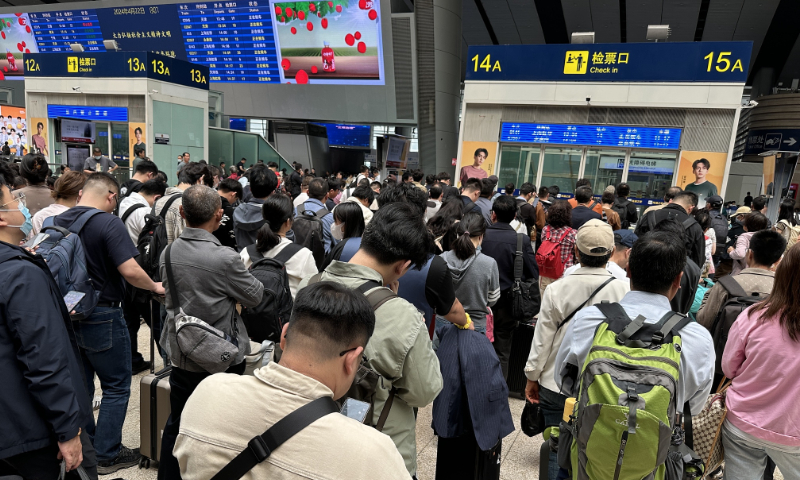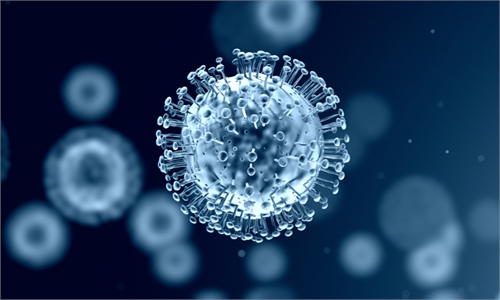China's disease control and prevention authority warns of increasing risks of infectious diseases during the approaching May Day holidays

As the May Day holidays approach, Beijing South Railway Station welcomes a peak in travel on April 22, 2024. Photo: VCG
China's disease control and prevention authority has recently warned of increasing risks of the spread of infectious diseases during the approaching May Day holidays and reminded localities to persist in implementing multi-channel monitoring of the COVID-19 epidemic and multi-pathogen monitoring of other respiratory infectious diseases.
According to a notice issued by China's National Disease Control and Prevention Administration regarding the prevention and control of key infectious disease epidemics during the upcoming May Day holidays and the spring and summer seasons, while the overall situation of infectious diseases in China is generally stable, COVID-19 viruses are still mutating, and there are still certain fluctuations in the epidemic situation, and the prevention and control of some infectious diseases are facing new situations and characteristics.
According to the notice, the global COVID-19 pandemic caused by the JN.1 variant has peaked and declined to a lower level, and the COVID-19 situation in China continues to remain at a low level with a wave-like pattern of prevailing. However, the viruses are still mutating, resulting in certain fluctuations in the epidemic situation.
Meanwhile, prevention and control of some infectious diseases in China are encountering new situations and characteristics. In some areas, influenza epidemics have not yet returned to the same level as in previous years. The pertussis epidemic is showing a rapid growth trend, and reported cases of hand-foot-mouth disease are significantly increasing. The co-occurrence of multiple diseases has become normalcy.
In addition, dengue fever, measles, and other epidemics have rebounded in multiple countries and regions globally, increasing the risk of overseas epidemics being imported into China.
In May when spring transitions into summer, some mosquito-borne diseases and intestinal infectious diseases enter their peak seasons. The increased mobility of personnel during the May Day holidays and the rise in gathering activities may amplify the transmission risk of infectious diseases such as COVID-19.
Therefore, the disease control and prevention authority emphasized that during the May Day holidays, all regions should strengthen epidemic prevention and control at ports, closely monitor key infectious diseases worldwide, such as COVID-19, dengue fever, measles and malaria, implement measures such as temperature monitoring, medical inspections, epidemiological investigations, and medical screenings for inbound travelers, conduct spot checks of nucleic acid testing for COVID-19 among inbound travelers, and enhance health education for inbound and outbound travelers.
The notice also stressed that all regions should continue to implement multi-channel monitoring of COVID-19 and multi-pathogen monitoring of respiratory infectious diseases, strengthen monitoring and early warning based on the characteristics of infectious disease outbreaks in spring and summer, conduct comprehensive analysis and assessment of the epidemic situation, and promptly conduct investigations and handling of outbreaks.
Meanwhile, the notice emphasized the need for adequate preparations for medical treatment and strengthened training for medical personnel and medical service management to ensure smooth and orderly medical services.
Moreover, in line with the goal of achieving a vaccination coverage rate of no less than 90 percent in the national immunization program, all localities should strengthen monitoring and assessment of vaccination rates. Efforts should be made to ensure that eligible children receive timely and complete vaccinations. Additionally, there should be continued promotion of vaccination among key populations with COVID-19 vaccines containing components targeting the XBB variant.
The disease control and prevention authority has told local authorities to strengthen epidemic prevention and control measures in key institutions such as childcare facilities and schools as well as elderly care institutions and social welfare institutions to reduce the risk of introducing and spreading of the epidemics.
The disease control and prevention authority also reminded the public to conduct self-health monitoring before traveling and after returning, and to take timely and effective preventive and treatment measures if any health issues are detected.
Global Times

